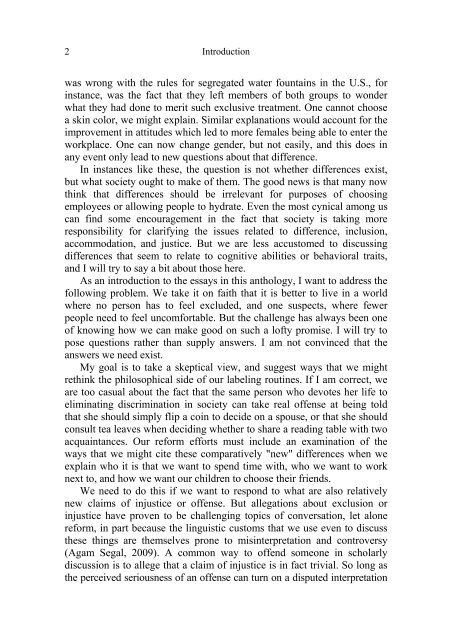978-1-4438-4527-4-sample
978-1-4438-4527-4-sample
978-1-4438-4527-4-sample
Create successful ePaper yourself
Turn your PDF publications into a flip-book with our unique Google optimized e-Paper software.
2<br />
Introduction<br />
was wrong with the rules for segregated water fountains in the U.S., for<br />
instance, was the fact that they left members of both groups to wonder<br />
what they had done to merit such exclusive treatment. One cannot choose<br />
a skin color, we might explain. Similar explanations would account for the<br />
improvement in attitudes which led to more females being able to enter the<br />
workplace. One can now change gender, but not easily, and this does in<br />
any event only lead to new questions about that difference.<br />
In instances like these, the question is not whether differences exist,<br />
but what society ought to make of them. The good news is that many now<br />
think that differences should be irrelevant for purposes of choosing<br />
employees or allowing people to hydrate. Even the most cynical among us<br />
can find some encouragement in the fact that society is taking more<br />
responsibility for clarifying the issues related to difference, inclusion,<br />
accommodation, and justice. But we are less accustomed to discussing<br />
differences that seem to relate to cognitive abilities or behavioral traits,<br />
and I will try to say a bit about those here.<br />
As an introduction to the essays in this anthology, I want to address the<br />
following problem. We take it on faith that it is better to live in a world<br />
where no person has to feel excluded, and one suspects, where fewer<br />
people need to feel uncomfortable. But the challenge has always been one<br />
of knowing how we can make good on such a lofty promise. I will try to<br />
pose questions rather than supply answers. I am not convinced that the<br />
answers we need exist.<br />
My goal is to take a skeptical view, and suggest ways that we might<br />
rethink the philosophical side of our labeling routines. If I am correct, we<br />
are too casual about the fact that the same person who devotes her life to<br />
eliminating discrimination in society can take real offense at being told<br />
that she should simply flip a coin to decide on a spouse, or that she should<br />
consult tea leaves when deciding whether to share a reading table with two<br />
acquaintances. Our reform efforts must include an examination of the<br />
ways that we might cite these comparatively "new" differences when we<br />
explain who it is that we want to spend time with, who we want to work<br />
next to, and how we want our children to choose their friends.<br />
We need to do this if we want to respond to what are also relatively<br />
new claims of injustice or offense. But allegations about exclusion or<br />
injustice have proven to be challenging topics of conversation, let alone<br />
reform, in part because the linguistic customs that we use even to discuss<br />
these things are themselves prone to misinterpretation and controversy<br />
(Agam Segal, 2009). A common way to offend someone in scholarly<br />
discussion is to allege that a claim of injustice is in fact trivial. So long as<br />
the perceived seriousness of an offense can turn on a disputed interpretation


